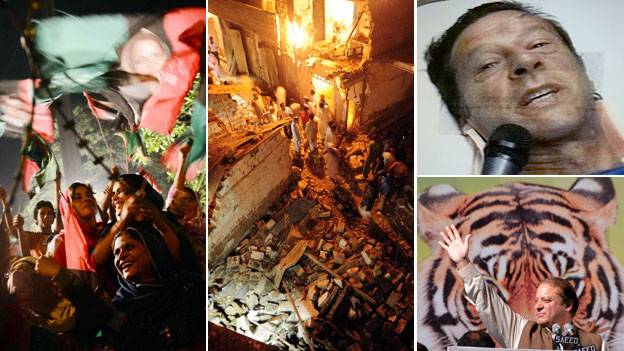by War News Updates Editor
How Will India Respond To Civil War In Pakistan? -- Sunil Dasgupta, East Asia Forum/UMBC and Brookings Institution
In 1971, India intervened militarily on behalf of Bengalis in the civil war in East Pakistan, dividing the country in two and helping to create Bangladesh.
In 2013, prospects of another civil war in Pakistan this time one that pits radical Islamists against the secular but authoritarian military have led once again to questions about what India would do. What would trigger Indian intervention, and who would India support?
In the context of a civil war between Islamists and the army in Pakistan, it is hard to imagine Pakistani refugees streaming into India and triggering intervention as the Bengalis did in 1971. Muslim Pakistanis do not see India as a refuge, and Taliban fighters are likely to seek refuge in Afghanistan, especially if the United States leaves the region.
Read more ....How will India respond to civil war in Pakistan? | East Asia Forum
Editor's Comment: I agree with the author's conclusion that if Pakistan plunges into a sectarian civil war .... India would prefer to stay out. But the problem is .... and will be .... Pakistan's nuclear weapons and WMDs. If radical Jihadists are on the verge of seizing these .... staying on the sidelines may not be an option for India .... or for anyone else including the U.S..
I've been following this for some time. We get little news of this in the American media but it will have a huge impact in the Middle and Far East. Both have nuclear capability and have been at war before. India has taken extensive actions to improve and modernize its military. And, on top of this, China sits on the northern borders and is watching this closely.
How Will India Respond To Civil War In Pakistan? -- Sunil Dasgupta, East Asia Forum/UMBC and Brookings Institution
In 1971, India intervened militarily on behalf of Bengalis in the civil war in East Pakistan, dividing the country in two and helping to create Bangladesh.
In 2013, prospects of another civil war in Pakistan this time one that pits radical Islamists against the secular but authoritarian military have led once again to questions about what India would do. What would trigger Indian intervention, and who would India support?
In the context of a civil war between Islamists and the army in Pakistan, it is hard to imagine Pakistani refugees streaming into India and triggering intervention as the Bengalis did in 1971. Muslim Pakistanis do not see India as a refuge, and Taliban fighters are likely to seek refuge in Afghanistan, especially if the United States leaves the region.
Read more ....How will India respond to civil war in Pakistan? | East Asia Forum
Editor's Comment: I agree with the author's conclusion that if Pakistan plunges into a sectarian civil war .... India would prefer to stay out. But the problem is .... and will be .... Pakistan's nuclear weapons and WMDs. If radical Jihadists are on the verge of seizing these .... staying on the sidelines may not be an option for India .... or for anyone else including the U.S..
I've been following this for some time. We get little news of this in the American media but it will have a huge impact in the Middle and Far East. Both have nuclear capability and have been at war before. India has taken extensive actions to improve and modernize its military. And, on top of this, China sits on the northern borders and is watching this closely.



